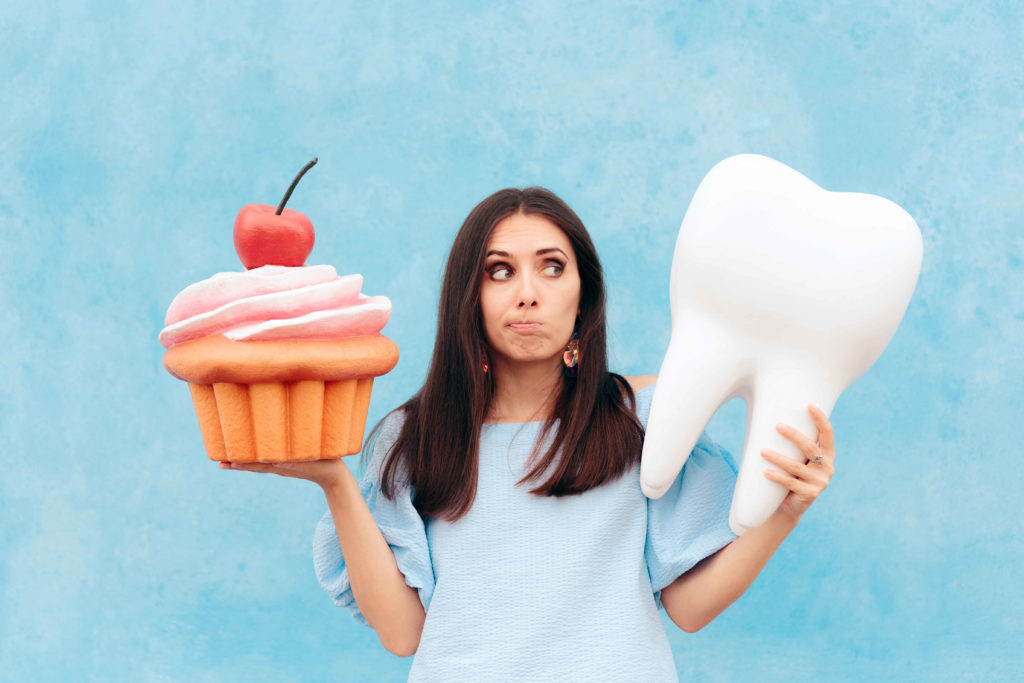L'power supply has a direct impact on the functioning of the body and your general state of health. What is less well known is that it also has repercussions on theoral hygiene. Many foods and beverages are harmful to teeth, gums and the mouth as a whole. HELVIDENT explains why it is necessary to limit regular consumption of the following categories of products. Discover 7 bad eating habits.
#1 Sodas and energy drinks
All dental hygienist in Lausanne or elsewhere in Switzerland will advise you to limit your consumption of sugary drinks. This is especially true of sodas, even diet ones, which are highly acidic, and energy drinks. They represent a real danger to your oral health. The worst thing is to sip them for a long time, which increases your enamel's exposure to sugar and acid. Plaque-causing bacteria thrive on them. Sodas containing caffeine, such as colas, also dry out the mouth. We advise you to rinse your mouth with water when you drink them.
#2 Sticky sweet foods
Whether you're a child or an adult, you're bound to love eating jelly beans or caramel. As well as being very sweet, these delicacies stick all over and between your teeth. The same goes for dried fruit (apricots, cranberries, dates...), considered to be healthy snacks. Apart from their nutritional value, they have one major drawback for your oral hygiene. They stay in your mouth for a long time, allowing bacteria to grow and acids to attack the enamel. The risk ofappearance of tooth decay is high. After eating sticky sweet foods, rinse your mouth with water and brush thoroughly. Don't forget to use an interdental cleaning aid such as a brush or dental floss.
#3 Sugar-enriched hot drinks
In itself, drinking tea or enjoying coffee are not bad eating habits for your teeth. The problem lies in the almost systematic addition of sugar to your favorite hot drinks. Sugar is the number-one enemy of your oral cavity. That's why we advise you to keep sugar consumption to a minimum, and to drink water after your hot beverage. This removes the staining substances from the surface of your teeth.
#4 Chewing or crunching ice cubes
The purpose of ice cubes is to refresh a drink. They're not meant to stay in your mouth, let alone be chewed or crunched. Yet some people think that ice cubes are good for your teeth because they're made entirely of water. Obviously, this is not true. Chewing or crunching hard substances weakens the enamel and leaves your teeth vulnerable. It's not unusual for a dentist in Lausanne to receive emergency dental treatment for this reason. We therefore recommend that you stop these unhealthy eating habits and instead drink water in its liquid form.
#5 Chips and other crispy foods
Chips and other crunchy foods often take pride of place on the aperitif table. The problem is that they contain a lot of starch, which tends to get stuck in and between the teeth. When eating this type of snack, be sure to clean your mouth thoroughly. Remove all food particles, as they contribute to the formation of dental plaque.
#6 Daily consumption of citrus fruit
Some foods, like citrus fruit, have a high acid content. It seems that many people make a habit of adding slices of lemon to their water, or drinking grapefruit juice every day. Although these fruits provide the body with vitamins, their frequent consumption exposes your enamel to erosion. Over time, this can lead to tooth decay. We recommend that you opt for still water. Try to reserve fruit and acidic drinks for occasional use.
#7 Alcoholic beverages
Alcohol has a number of disadvantages for overall health. In the oral cavity, it causes dehydration and consequent dryness of the mucous membranes. People who consume alcohol in excess generally suffer from a progressive drop in saliva production. Saliva plays a major role in the natural cleansing of the mouth. Without it, there is an increased risk of oral infection, gum disease and tooth loosening.
The World Health Organization and Swiss Society of Dentists recommend consulting a specialist on a regular basis. He or she can detect tooth decay, gingivitis and other oral pathologies in good time, so you can avoid dental emergencies.
HELVIDENT welcomes you to one of its 3 dental clinics in Lausanne, Fribourg and Aigle, in the French-speaking part of Switzerland. Contact us to make an appointment with one of our dentists, orthodontists or dental hygienists.

